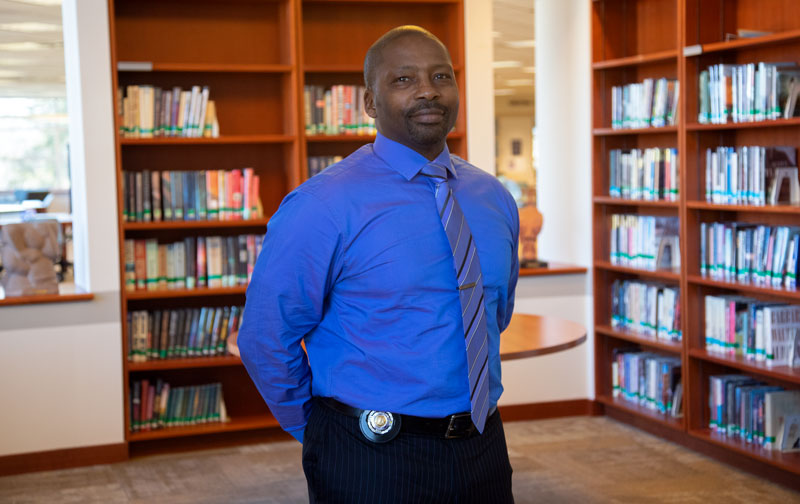Immaculata News
Robert Brockenbrough

“I just wanted to serve my community,” says Robert Brockenbrough ’22. That’s what led him first into the U.S. Army and then to the Philadelphia Police Department, where he has held various positions over the years and is now a lieutenant supervising detectives who investigate non-fatal shootings.
“We have to…ensure that we are giving people good community service so that we can get good community cooperation so that we can solve a lot more of these crimes and reduce this gun violence,” Brockenbrough says. He finds it rewarding to ensure the safety and welfare of children and the elderly, two of the most vulnerable populations, preventing crimes against them and bringing perpetrators to justice.
But this rewarding work involves high risks. When officers leave their families to take care of a community, “they may not go home that night,” Brockenbrough says.
Police officers are called to protect and serve, but communities may or may not trust them to do so. “People don’t see individual police officers. They see a uniform,” Brockenbrough observes. “Law enforcement, just like any other occupation, has its individuals who aren’t upholding their professionalism,” he acknowledges. However, he adds, “There are so many good officers just going out every day to do a good job. … I treat people with respect, and I expect the people under me to treat people with respect.”
To enhance the public service he provides, Brockenbrough enrolled in Immaculata’s Bachelor of Science in emergency planning and management. “It’s an up-and-coming field,” he says, “one that’s going to be needed.” He was recently inducted into the Order of the Sword and Shield Honor Society for protective security disciplines and will graduate this Saturday.
One of Brockenbrough’s motivations for earning his degree was his desire to set a good example for his two daughters. “I didn’t want to be a hypocrite!” he joked. “I can’t expect them to go on to get higher education if I don’t want to get more education myself.”
Brockenbrough appreciates how all his courses broadened his perspective, and he found his emergency management systems course especially helpful. In it, he gained a better understanding of the Incident Command System (ICS), a structured framework that helps multiple agencies coordinate and plan their emergency efforts. Brockenbrough had some basic experience with ICS from his time as a patrolling officer. Through the class, he learned how to tailor the system to larger incidents, how to organize the responsibilities of a range of first responders, and how to plan for support functions such as transportation and communication.
For his capstone project, Brockenbrough reviewed factors that contribute to gun violence in the Kensington section of Philadelphia as well as prevention methods. In previous generations, Brockenbrough points out, Kensington was an industrial region, with plenty of factories and blue-collar jobs that allowed most people, even those with little education, to support their families. But more recently, most of those businesses left. “People can’t make money; that’s when the bad element comes in,” Brockenbrough says.
He leads a squad of detectives in investigating shootings—interviewing complainants and witnesses, processing the crime scene, collecting and numbering each piece of evidence and presenting cases in court.
“It’s a very time-consuming process,” Brockenbrough says. “Sometimes I joke with the detectives, like, ‘Look, we’ve got to have this job wrapped up before the credits roll!’” When he and his wife watch cop shows together, Brockenbrough sometimes comments on what he would do differently from the police on TV. “My wife hates it!” he says, smiling. “She’s like, ‘OK, remember—it’s a show!’”
He says “Law and Order” is a relatively realistic depiction of law enforcement. He also enjoys the police sitcom “Brooklyn Nine-Nine,” and showed his fellow classmates in an instructor’s course at the Philadelphia Police Academy a clip of a detective asking a line-up of suspects to sing to help a witness identify the one to accuse. “You’ve got to have those fun times, because sometimes it gets a little too serious,” Brockenbrough says. “But it’s a good job.”
Brockenbrough has worked hard and served his community well for 28 years on the police force. Next, he plans to transition to a related career in public safety at a university, relocating to California to be with family. He recently spoke with Immaculata’s director of campus safety, Dennis Dougherty, who talked with him about the field and campus emergency plans.
“In today’s times, I think every university, corporation, business—everyone—needs to know something about emergency planning,” Brockenbrough says. “Everybody plays a part in making the community resilient. It’s not just up to first responders and emergency management personnel, but people in the community. Knowing what needs to be done in an emergency situation makes everybody’s job easier and can really help the community bounce back.”